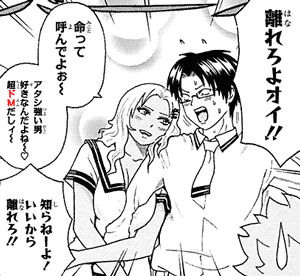Personality Type
In Japan, do-m ドM often refers to a romantic personality type, rather than a sexual disposition. Basically, a do-M ドM person is the kind of person that:- Likes doing things for others.
- Enjoys being teased.
- Is romantically passive.
When I put it the way above, it doesn't sound that bad, does it?
However, in manga and anime, do-M ドM characters end up being the hardcore version of the above:
- Likes being told to do things, ordered around like a slave.
- Enjoys being verbally abused, called things, treated coldly.
- Weak to pretty much any romantic advances.
From this pattern, do-M ドM heroines often fall in love with a male lead that thinks the heroine is extremely annoying, clingy, or just a pain to deal with. The male character treats the do-M girl with indifference, or sometimes like garbage.
Because if he didn't do that, if the guy was nice to all girls in the world like your average harem protagonist, then there would be nothing to imply that the heroine is masochistic to begin with.
The do-M character's romantic interest needs to be cold and indifferent in order for the whole do-M thing to make sense at all.
Manga: Saiki Kusuo no Psi Nan 斉木楠雄のΨ難 (Chapter 163, オーラΨ(サイ)トをかいくぐれ!)
- hanarero yo oi!!
離れろよオイ!!
Let go of [me], hey!! - Mikoto tte yonde yoo~~
命って呼んでよぉ~
Call me Mikoto~~ - atashi tsuyoi otoko suki nanda yo ne~~♡
アタシ強い男好きなんだよね~~♡
I like strong men~~♡ - chou do-emu dashii~~
超ドMだしィ~~
[I] am a ultra, super masochist~~ - shiranee yo! ii kara hanarero!!
知らねーよ!いいから離れろ!!
[I don't care!] [Just] let go of [me]!!
If the romantic interest isn't indifferent, there needs to be something to make up for the lack of verbal abuse. This something is often ordering around the do-M character more often.
That's how you get a do-M male lead who keeps getting bossed around by a female student council president or something like that.
By the way, the term for the opposite personality is do-S ドS, "super sadist." A do-M and a do-S pretty much complete each other.
In regards to romantic passiveness and assertiveness alone, see soushokukei 草食系 and nikushokukei 肉食系 for the personality, and seme 攻め and uke 受け for a single ship.
Terminology
The katakanized alphabet letter M, emu エム, means masochistic. If you're M, you're a masochistic. Conversely, if you're S, you're sadistic.- watahi wa emu desu
私はMです
I'm masochistic.
Syntactically these letters are na-adjectives, so it's closer to "masochistic" than to "masochist."
- {emu na} hito
Mな人
A person [that] {is masochistic}.
A masochistic person. - chotto emu
ちょっとM
A bit masochistic.
In the case of do-emu ドM, it's being paired with the intensifying prefix do~ ド~, "super." This is also spelled do-emu 弩M.
As mentioned previously, this whole M thing can also refer to masochistic in the BDSM sense. The word mazo マゾ, for example, also means "masochist," but is often used in the sexual sense, rather than in the personality sense.
Some related terms:
- emu-otoko
M男
Masochistic man.- emu-o エムオ is another possible reading.
- emu-onna
M女
Masochistic woman. - zokuzoku suru
ゾクゾクする
To shiver. (with excitement.)
ドMホイホイ
On websites that allow tagging, do-M hoihoi ドMホイホイ means it's something that masochists would like.The mimetic word hoihoi ホイホイ means when people blindly or thoughtlessly follow or go after something, often in the sense of taking a bait. In cartoons, it's like when a character smells something good, like pie, and they just float in direction to it without thinking.
In other words, the do-M hoihoi tag is used on things made to bait masochists. The most obvious example of this are low-angle illustrations focusing on the legs of girls sitting as if they were queens on a throne.

No comments: